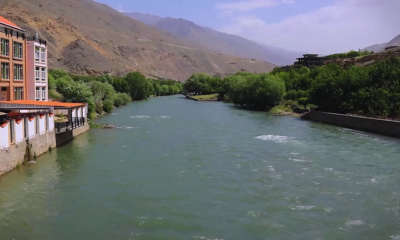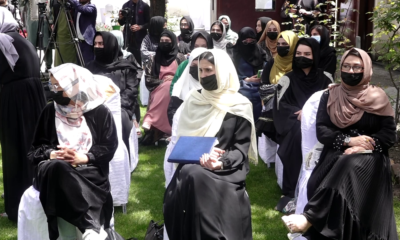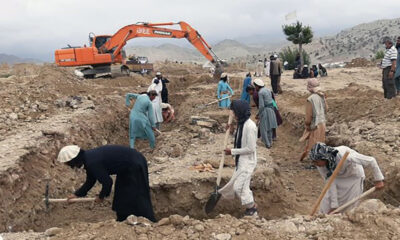World
UN General Assembly backs Palestinian bid for membership

The United Nations General Assembly on Friday overwhelmingly backed a Palestinian bid to become a full U.N. member by recognizing it as qualified to join and recommending the U.N. Security Council “reconsider the matter favorably.”
The vote by the 193-member General Assembly was a global survey of support for the Palestinian bid to become a full U.N. member – a move that would effectively recognize a Palestinian state – after the United States vetoed it in the U.N. Security Council last month.
The assembly adopted a resolution with 143 votes in favor and nine against – including the U.S. and Israel – while 25 countries abstained. It does not give the Palestinians full U.N. membership, but simply recognizes them as qualified to join.
The resolution “determines that the State of Palestine … should therefore be admitted to membership” and it “recommends that the Security Council reconsider the matter favorably.”
The Palestinian push for full U.N. membership comes seven months into a war between Israel and Hamas in the Gaza Strip, and as Israel is expanding settlements in the occupied West Bank, which the U.N. considers to be illegal.
“We want peace, we want freedom,” Palestinian U.N. Ambassador Riyad Mansour told the assembly before the vote. “A yes vote is a vote for Palestinian existence, it is not against any state. … It is an investment in peace.”
“Voting yes is the right thing to do,” he said in remarks that drew applause.
Under the founding U.N. Charter, membership is open to “peace-loving states” that accept the obligations in that document and are able and willing to carry them out.
“As long as so many of you are ‘Jew-hating,’ you don’t really care that the Palestinians are not ‘peace-loving’,” U.N. Ambassador Gilad Erdan, who spoke after Mansour, told his fellow diplomats. He accused the assembly of shredding the U.N. Charter – as he used a small shredder to destroy a copy of the Charter while at the lectern.
“Shame on you,” Erdan said.
An application to become a full U.N. member first needs to be approved by the 15-member Security Council and then the General Assembly. If the measure is again voted on by the council it is likely to face the same fate: a U.S. veto.
ADDITIONAL U.N. RIGHTSDeputy U.S. Ambassador to the U.N. Robert Wood told the General Assembly after the vote that unilateral measures at the U.N. and on the ground will not advance a two-state solution.
“Our vote does not reflect opposition to Palestinian statehood; we have been very clear that we support it and seek to advance it meaningfully. Instead, it is an acknowledgement that statehood will only come from a process that involves direct negotiations between the parties,” he said.
The United Nations has long endorsed a vision of two states living side by side within secure and recognized borders. Palestinians want a state in the West Bank, east Jerusalem and Gaza Strip, all territory captured by Israel in the 1967 war with neighboring Arab states.
The General Assembly resolution adopted on Friday does give the Palestinians some additional rights and privileges from September 2024 – like a seat among the U.N. members in the assembly hall – but they will not be granted a vote in the body.
The Palestinians are currently a non-member observer state, a de facto recognition of statehood that was granted by the U.N. General Assembly in 2012.
They are represented at the U.N. by the Palestinian Authority, which exercises limited self-rule in the West Bank. Hamas ousted the Palestinian Authority from power in Gaza in 2007. Hamas – which has a charter calling for Israel’s destruction – launched the Oct. 7 attack on Israel that triggered Israel’s assault on Gaza.
Erdan said on Monday that, if the General Assembly adopted the resolution, he expected Washington to cut funding to the United Nations and its institutions.
Under U.S. law, Washington cannot fund any U.N. organization that grants full membership to any group that does not have the “internationally recognized attributes” of statehood. The United States cut funding in 2011 for the U.N. cultural agency, UNESCO, after the Palestinians joined as a full member.
On Thursday, 25 Republican U.S. senators – more than half of the party’s members in the chamber – introduced a bill to tighten those restrictions and cut off funding to any entity giving rights and privileges to the Palestinians. The bill is unlikely to pass the Senate, which is controlled by President Joe Biden’s Democrats.
(Reuters)
World
As Iran tensions build, US military moves warplanes to reinforce Middle East
U.S. President Donald Trump threatened Iran on Sunday with bombing and secondary tariffs if Tehran did not come to an agreement with Washington over its nuclear program.

U.S. Defense Secretary Pete Hegseth has reinforced U.S. military capability in the Middle East with more warplanes, the Pentagon said on Tuesday, amid a more than two-week-old U.S. bombing campaign in Yemen and mounting tensions with Iran, Reuters reported.
The Pentagon’s brief statement did not specify which aircraft were being deployed or where precisely they were sent.
However, as many as six B-2 bombers have relocated in the past week or so to a U.S.-British military base on the Indian Ocean island of Diego Garcia, according to U.S. officials, speaking on condition of anonymity.
Experts say that puts the B-2s, which have stealth technology and are equipped to carry the heaviest U.S. bombs and nuclear weapons, in an ideal position to operate in the Middle East.
“Should Iran or its proxies threaten American personnel and interests in the region, the United States will take decisive action to defend our people,” Pentagon spokesperson Sean Parnell said in a statement.
The U.S. military’s Strategic Command has declined to say how many B-2s have reached Diego Garcia and noted that it does not comment on exercises or operations involving the B-2.
There is already considerable firepower in the Middle East and the U.S. military will soon have two aircraft carriers in the region, read the report.
U.S. President Donald Trump threatened Iran on Sunday with bombing and secondary tariffs if Tehran did not come to an agreement with Washington over its nuclear program.
While B-2 bombers have been employed to strike buried Houthi targets in Yemen, most experts say use of the stealthy bomber is overkill there and the targets aren’t buried so deeply.
However, the B-2 is equipped to carry America’s most potent bomb — the 30,000-pound GBU-57 Massive Ordnance Penetrator. That is the weapon that experts say could be used to strike Iran’s nuclear program.
There are only 20 B-2 bombers in the Air Force’s inventory so they are usually used sparingly.
Iran’s Supreme Leader Ayatollah Ali Khamenei said on Monday the U.S. would receive a strong blow if Trump followed through with his threats.
Revolutionary Guards Aerospace Commander Amirali Hajizadeh threatened U.S. forces in the Middle East, noting American bases in the Middle East and adding: “They are in a glass house and should not throw stones.”
One official told Reuters that the U.S. military was also moving some air defense capabilities from Asia to the Middle East.
In his 2017-2021 term, Trump withdrew the U.S. from a 2015 deal between Iran and world powers that placed strict limits on Tehran’s disputed nuclear activities in exchange for sanctions relief. Trump also reimposed sweeping U.S. sanctions.
Since then, Iran has far surpassed that deal’s limits on uranium enrichment.
Western powers accuse Iran of having a clandestine agenda to develop nuclear weapons capability by enriching uranium to a high level of fissile purity, above what they say is justifiable for a civilian atomic energy program. Tehran says its nuclear program is wholly for civilian energy purposes.
World
Israel kills Hezbollah official in deadly Beirut airstrike

An Israeli airstrike killed four people including a Hezbollah official in Beirut’s southern suburbs on Tuesday, a Lebanese security source said, further testing a shaky ceasefire between Israel and Iran-backed Hezbollah.
The Israeli military said the official – Hassan Bdeir – was a member of a Hezbollah unit and Iran’s Quds Force, and he had assisted the Palestinian group Hamas in planning a “significant and imminent terror attack against Israeli civilians,” Reuters reported.
The Lebanese security source said the target was a Hezbollah figure whose responsibilities included the Palestinian file. The Lebanese health ministry said the strike killed four people – including a woman – and wounded seven others.
It marked Israel’s second airstrike in the Hezbollah-controlled suburb of Beirut in five days, adding to strains on the U.S.-brokered ceasefire that ended last year’s devastating conflict.
The attacks on Beirut’s southern suburbs have resumed at a time of broader escalation in the region, with Israel having restarted Gaza strikes after a two-month truce and the United States hitting the Iran-aligned Houthis of Yemen in a bid to get them to stop attacking Red Sea shipping.
Hezbollah lawmaker Ibrahim Moussawi said the Israeli attack amounted to “a major and severe aggression that has escalated the situation to an entirely different level”.
Speaking in a televised statement after visiting the building that was struck, he called on the Lebanese state to “activate the highest level of diplomacy to find solutions”.
Israeli Foreign Minister Gideon Saar said the eliminated Hezbollah operative posed “a real and immediate threat”. “We expect Lebanon to take action to uproot terrorist organizations acting within its borders against Israel,” he said.
Israel dealt severe blows to Hezbollah in the war, killing thousands of its fighters, destroying much of it arsenal and eliminating its top leadership including Hassan Nasrallah.
Hezbollah has denied any role in recent rocket attacks from Lebanon towards Israel, including one that prompted Israel to carry out an airstrike on the southern suburbs last Friday.
Tuesday’s strike in the early hours appeared to have damaged the upper three floors of a building, a Reuters reporter at the scene said, with the balconies of those floors blown out.
The glass on the floors below was intact, indicating a targeted strike. Ambulances were at the scene as families fled to other parts of Beirut.
There was no advance warning, in contrast to the attack on Friday when the Israeli military announced which building it intended to hit and ordered residents to leave the area.
Lebanese President Joseph Aoun condemned the latest airstrike, calling it a “dangerous warning” that signals premeditated intentions against Lebanon, which would intensify diplomatic outreach and mobilise international allies.
Lebanese Prime Minister Nawaf Salam said the strike was a flagrant breach of a U.N. Security Council Resolution upon which the ceasefire was based, and the ceasefire arrangement.
U.S. BACKS ISRAEL
The ceasefire agreement demanded that southern Lebanon be free of Hezbollah fighters and weapons, that Lebanese troops deploy into the area, and that Israeli troops withdraw.
But each side accuses the other of failing to implement the terms fully. Israel says Hezbollah still has infrastructure in the south, while Lebanon and Hezbollah say Israel is occupying Lebanese soil by not withdrawing from five hilltop positions.
The U.S. State Department said that Israel was defending itself from rocket attacks that came from Lebanon and that Washington blamed “terrorists” for the resumption of hostilities.
“Hostilities have resumed because terrorists launched rockets into Israel from Lebanon,” a State Department spokesperson said in an email, responding to a question from Reuters seeking reaction to Tuesday’s airstrike. Washington supported Israel’s response, the spokesperson said.
The Israel-Hezbollah conflict was ignited when Hezbollah opened fire in support of Hamas at the start of the Gaza war. It escalated in September when Israel went on the offensive, declaring the aim of securing the return home of tens of thousands of people evacuated from homes in the north.
The war uprooted more than a million people and killed at least 3,768 people in Lebanon, according to a Lebanese health ministry toll from November. Dozens more have been reported killed by Israeli fire since the ceasefire.
Lebanon’s figures do not distinguish between civilians and fighters.
During the war, Hezbollah strikes killed 45 civilians in northern Israel and the Israeli-occupied Golan Heights. At least 73 Israeli soldiers were killed in northern Israel, the Golan Heights, and in combat in southern Lebanon, according to Israeli authorities.
World
Trump says Zelenskiy wants to back out of critical minerals deal

U.S. President Donald Trump said on Sunday Ukrainian President Volodymyr Zelenskiy wants to back out of a critical minerals deal, warning the Ukrainian leader would face big problems if he did.
“He’s trying to back out of the rare earth deal and if he does that he’s got some problems, big, big problems,” Trump told reporters.
“He wants to be a member of NATO, but he’s never going to be a member of NATO. He understands that.”
(Reuters)
-

 Latest News5 days ago
Latest News5 days agoMore than 70,000 Afghans returned home in third week of March: IOM
-

 Health4 days ago
Health4 days agoGlobal organizations warn of health crisis due to aid cuts in Afghanistan
-

 International Sports5 days ago
International Sports5 days agoChennai grapple with IPL home truth after Bengaluru defeat
-
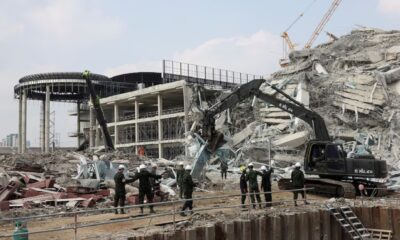
 World5 days ago
World5 days agoMyanmar quake death toll nears 700 as international aid starts to arrive
-

 World3 days ago
World3 days agoMyanmar quake death toll hits 1,700 as aid scramble intensifies
-

 Sport4 days ago
Sport4 days agoIPL 2025: Gujarat Titans beat Mumbai Indians by 36 runs
-

 Latest News2 days ago
Latest News2 days agoSwitzerland re-establishes presence in Kabul with humanitarian office
-
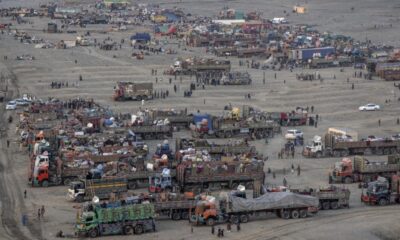
 Latest News2 days ago
Latest News2 days agoPakistan plans to expel 3 million Afghan refugees this year


